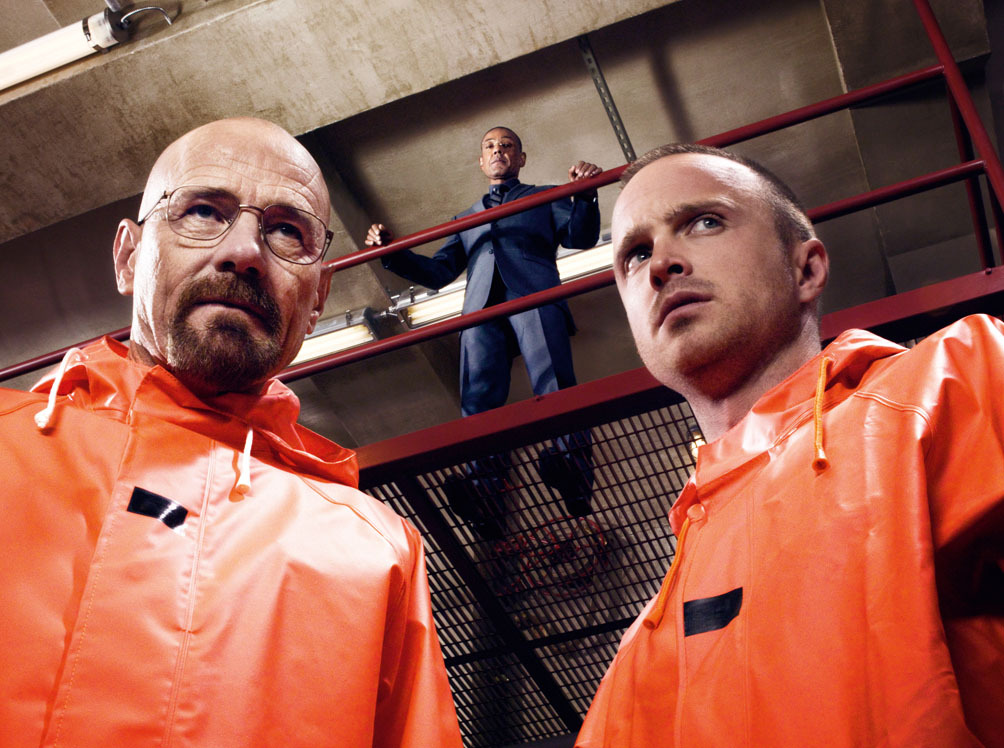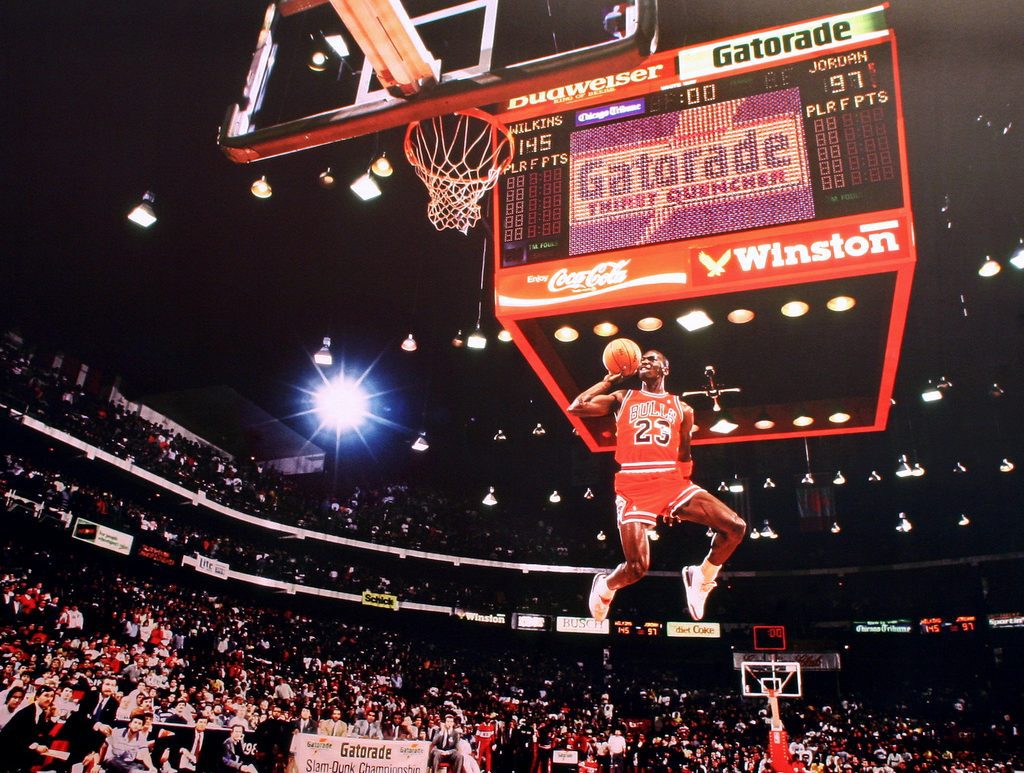In this edition of Sonny Says, I discuss Breaking Bad‘s impact on its viewers, the top five comedy movies of the 21st century, NBA jersey retirements and The Godfather/The Sopranos.
Collin – “In relation to the question you answered last week about whether Breaking Bad could be held at least partially responsible for the drug epidemic in America, isn’t it more plausible that people who have watched Breaking Bad from start to finish would be more inclined to try to become a kingpin than a meth user?”
Now this is something I could buy into! I was skeptical about the notion that Breaking Bad or any television show/movie/video game should receive too much blame for any negative (or positive) actions of the general public, but that doesn’t mean pop culture mediums don’t put thoughts in people’s heads. I’ve watched Breaking Bad from Pilot to Finale three times, and never once have I felt enticed to try or curious about the high of crystal meth. However, I refuse to sit here and lie to everyone and say that I haven’t, at least for a few seconds, pondered whether I had what it takes to become the kingpin of an expansive drug empire. I’ve definitely (briefly) considered breaking bad.
I’m very happy to report that I haven’t taken any steps towards making these brief, fleeting thoughts a reality. There are multiple reasons this is the case: First, my morals prevent me from doing such a thing (I’m mostly opposed to the prospect of having to kill people, which seemed like a necessity for Walter White to climb to the top of the meth dealer ranks). Second, I’d be terrified I would end up in prison for a very long time, and not even because I killed somebody. Being a drug kingpin leaves you susceptible to spending your entire life in prison if you got caught. Third, unlike Walter White, I have never been in such a desperate financial position where I felt like becoming a meth cook/dealer/eventual kingpin was the only way I could prevent my family from facing hardship after my death.
Finally — and this is the part I suspect that most people overlook when they imagine becoming a real-life Heisenberg — I have an extremely limited understanding of the chemistry of cooking the purest meth imaginable (and chemistry in general). Even though Breaking Bad showed everyone a blueprint as to how to get into the meth game, Walt used his abnormal mastery of science to get his foot in the door and also to evade being killed/caught more times than even his big brain could count.
I like to think that when other Breaking Bad fans ponder this thought (and it’s inevitable that at some point during their viewing experience they do) they have the common sense to quickly run through a similar mental and moral checklist and conclude “So this is a TV show and not real life, and the only thing I should be pondering right now is what snack to have as I continue this binge.” If their thoughts go beyond that, then it’s safe to say that this was individual that wasn’t all that reasonable or rational before they started watching Breaking Bad, because even though Walter White amassed an incredible empire and made an incomprehensible amount money, it wasn’t exactly a smooth ride getting there.
This phenomena isn’t exclusive to Breaking Bad though. Whenever I’m sitting around with a group of friends busting balls, having drinks and smoking cigars, I think to myself, “We could absolutely form our own mafia family.” That’s The Sopranos talking. Whenever I get on an airplane I find myself wondering, “Who here would be useful if this plane went down and we ended up on a deserted island?” That’s Lost talking. Every time I’m in a doctors office or emergency room I start to think, “Should I have pursued a career in the medical field?” That’s ER talking. Any great television show can briefly and sporadically make viewers think about a life that exists outside of their own reality … one that closer resembles what exists on their television screen.
Weston – “What are the Top 5 classic/iconic comedy films of the 21st century?”
Yeesh. This question is a handful, mainly because of the wording — “classic/iconic” — which essentially eliminates my own personal feelings from the equation. Some movies that are classic or iconic to me may not be to others (a textbook example would be Project X, which has everything to do with who I first watched it with and when it was that we watched it), so I needed to do my best to remove certain personal biases, or at least the biases that could be deemed circumstantial.
In the end, I decided my choices should be based half on my own personal opinion of the film (and for what it’s worth, I really feel like I have excellent taste in film), and half on how “classic/iconic” the general consensus seems to feel that movie is (I based this on how relevant it feels culturally today and how big it was at the time of its release).
I also made the executive decision to remove all niche comedies from consideration. That means movies that were classified or blatantly marketed as Romantic Comedies, Action Comedies, Sports Comedies and Comedy-Dramas (also known as Dramedy’s) are off the table, because they could be more romance, action, sports or drama than they are comedy, so therefore they shouldn’t qualify as comedy films. A film like (500) Days of Summer feels (to me) both classic and iconic (and perhaps I’m misinformed, but I suspect I’m in the minority for feeling this way), but even if it was universally agreed upon that it was indeed both classic and iconic, I couldn’t include it in this Top 5 because it’s equal parts comedy, romance and drama.
So before I get to my top five, I need to address my seven toughest cuts. Once I scraped through many Wikipedia pages of movies that were released each year in the 2000’s, I had a list of twelve comedy films that I felt anyone could make a realistic case for as one of the five most classic/iconic comedy films of the 21st Century. Ultimately, these seven films were held out because they lacked in one of the two categories I used as my criteria. Those films are:
Anchorman: The Legend of Ron Burgundy – The Will Ferrell-est Will Ferrell movie of all-time. It’s a movie that I don’t really love all that much, but it was indisputably iconic at the time of its release. If we were going based on my personal feelings alone, I would have underrated flicks like Due Date or Dodgeball ahead.
Horrible Bosses – An absolutely hilarious movie that seemingly has no lasting legacy whatsoever.
Bridesmaids – A critical and box office success that I never totally got behind. It gets funnier with repeated views, as a good comedy should, but it doesn’t crack the top five.
Road Trip/Old School – My choices for the two funniest movies of the first five years of the 00’s. Neither seems to be tremendously relevant a decade and a half later.
The 40 Year Old Virgin – The concept alone qualifies The 40 Year Old Virgin to be considered as one of the most classic/iconic comedy films of the 21st century.
The Hangover Part II – For whatever reason, there seems to be the belief that The Hangover Part II is an unfunny movie. I will never understand that sentiment.
And with all of that said, my Mount Rushmore (plus one) of classic/iconic comedies of the 21st Century are:
Superbad – The best high school party movie ever and the film that gave us McLovin, the 25-year old Hawaiian organ donor. This was an easy choice.
Knocked Up – The single most underrated comedy movie mentioned in this column. A movie that I absolutely love and have re-watched more than any comedy aside from two of the films in my Top 5. The legacy of Knocked Up isn’t quite where I expected that it would be had somebody asked me in 2007 how I thought Knocked Up would be regarded ten years later, but still, it’s good enough to be the final movie selected for my Top 5.
Step Brothers – With all due respect to Anchorman, this is the funniest and most quotable Will Ferrell movie ever, and it’s legacy seems to be improving as time goes by.
Wedding Crashers/The Hangover – In my humble opinion, these two are the Michael Jordan and LeBron James of 21st Century comedy films respectively, meaning there really isn’t any right answer as to which of the two is greater. Wedding Crashers was peak Vince Vaughn, peak Owen Wilson, peak Wilson brothers (apologies to Luke), peak Vince Vaughn/Owen Wilson duo. Additionally, it’s the most quotable comedy film of the century and it put the idea of crashing weddings into the national consciousness for the first time ever.
The Hangover breathed new life into the buddy comedy/road trip comedy genre, made big blowout Bachelor parties a must-have for any groom to be, turned Bradley Cooper into one of the most desirable leading men in Hollywood, shined a light on Zach Galifianakis as the lovable weirdo he truly is, and ranks as the second most quotable comedy film of the century. We can’t go wrong with either of these two choices.
Mike – Based on Chris Bosh and Zach Randolph, do you think retiring numbers is overrated?
As I told Hardwood and Hollywood’s own Mike Cortez when he slid into my Twitter DM’s to ask me this question, I actually have a firm and elaborately constructed take on this topic, one that has been more carefully considered than it certainly needs to be. I tend to spend a great deal of time thinking about the issues within sports that matter enough that someone should be coming up with a solution or way of operating, but they don’t really matter in the grand scheme of things. If we don’t solve the “how should NBA teams decide whose jerseys to retire” conundrum, life will go on … it will just be something that continues to bug me as my life goes on.
Just as a disclaimer, my stance on jersey retirement, and more specifically, the practice of hanging jerseys/jersey banners in the rafters of arenas to honor retired former players applies only to the NBA. So what I say here has nothing to do with the NFL, MLB or NHL (and especially not any collegiate sports, because those MF’ers have nearly everything ass backwards) and how teams in those leagues handle honoring their former players.
In The Book of Basketball — which, if you’re a basketball fan, might as well be the Bible — Bill Simmons suggests that there is a cutoff point for the Basketball Hall of Fame, meaning the number of possible Hall of Famers shouldn’t be limitless. He suggests 96 spots in the Hall of Fame, and if any additions need to be made, then current Hall of Famers need to be subtracted from the Hall (or placed in one of the wings of the Hall of Fame that isn’t the Pyramid … look, if you’re confused by what I’m talking about, just buy the damn book).
I believe NBA teams should follow suit and put a hard cap on the number of players whose jerseys are hanging in the rafters of their home arena at any given time. Let’s set that number at 12, as in the number of players on an active NBA roster. So that means the Boston Celtics, who have retired a whopping twenty-one players numbers (plus one for Red Auerbach … I suppose we can allow for one Head Coach “jersey” to be hung in the rafters in addition to the twelve player jerseys) will need to make multiple cuts, especially whenever they decide to accommodate Paul Pierce and Kevin Garnett.
Now there are multiple reasons why this idea makes all kinds of sense, but none as much as the fact that this would force teams to prioritize their former players, and establish a de facto All-Time Team. Does anyone really care who the 18th best Boston Celtic has been? Does whoever that is — Frank Ramsey perhaps? — really need their jersey hanging in the rafters? Is there really a need for more than the twelve most memorable players in a franchises history to be honored? Couldn’t their inclusion (or lack thereof) be determined by a poll of all season ticket holders, former players and local media members? Doesn’t that give us a better idea of who should be immortalized (at least until a better candidate comes along and bumps them out of the top twelve)?
So let’s use the Celtics as an example: based on career accomplishments in a Celtics uniform, the twelve players I would select to have banners hanging in Boston would be Bob Cousy, Bill Russell, Tom Heinsohn, Sam Jones, John Havlicek, Dave Cowens, Larry Bird, Kevin McHale, Robert Parish, Dennis Johnson, Paul Pierce, and Kevin Garnett, plus one for Red Auerbach. So when Isaiah Thomas and Gordon Hayward end their Celtics careers, their numbers can’t be retired unless a majority of voters agree their Celtics careers carried more weight than at least one player whose jersey is already in the rafters.
Back to the original question … Based on this criteria, I do believe that Chris Bosh and Zach Randolph should be celebrated and honored in Miami and Memphis respectively. Bosh is probably the 5th most important player in Miami Heat history (behind LeBron James, Dwyane Wade, Shaquille O’Neal and Alonzo Mourning) and as he claimed in 2013, he should be a surefire Hall of Famer. Take it from someone who watched probably 90 percent of those Miami Heat games from 2010 through 2014; Bosh was more vital to the Heat’s success than he ever gets credit for.
Randolph’s Hall of Fame candidacy is admittedly much murkier than Bosh’s, but his jersey-in-the-rafters candidacy is just as rock solid as Bosh’s. He was the face of the Grit and Grind Grizzlies, a lovable group of hard-nosed ballers who continued zigging (playing bigger and slower) when other teams started zagging (playing smaller and faster), and just because Memphis never made it beyond the Western Conference Finals, and just because Randolph was only twice an All-Star and made just one All-NBA team, it doesn’t change the fact that he was the most important player in the history of the Grizzlies franchise, and that means something.
Alta – “Having seen both The Godfather and The Sopranos so many times, which do you think is a more accurate portrayal of our family?”
We don’t talk about family business on the internet.

















